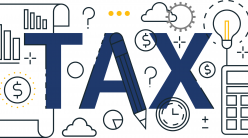The implementation of tax laws has contributed positively to the country’s socio-economic development. However, when the level of integration is increasingly expanded, the domestic and foreign economies fluctuate, which has put a requirement to amend and supplement tax policies to suit reality…
From this urgent request, implementing the Resolutions of the Politburo, the National Assembly and the direction of the Prime Minister, the Ministry of Finance is presiding over the development of the draft Law amending and supplementing a number of articles of the Law. Law on VAT, Law on Special Consumption Tax (Special Consumption Tax), Law on Corporate Income Tax (CIT), Law on Personal Income Tax (PIT) and Law on Natural Resources Tax to submit to the Government in the third quarter of 2017 and report The National Assembly Standing Committee added to the National Assembly’s Law and Ordinance Development Program in 2018.
Modify tax laws on the principle of transparency, simplicity, and reduction of procedures
According to Deputy Minister of Finance Vu Thi Mai, the development of the Law amending and supplementing the Tax Law is first of all to institutionalize the views, guidelines and policies of the State through the continued implementation of the following tasks. that the Politburo (Resolution No. 07/NQ-TW dated November 18, 2016), the National Assembly (Resolution 25/2016/QH14 dated November 9, 2016), the Government (Resolution No. 35/NQ- CP dated May 16, 2016), the Prime Minister (Directive 26/CT-TTg dated June 6, 2017) and the Tax Reform Strategy 2011-2020.
The tax policy reform is also to meet and be compatible with the preferential contents that the new laws promulgated by the National Assembly such as the Law on Supporting Small and Medium Enterprises, the Law on Investment, the Law on Minerals, etc. to contribute to the orientation. production and consumption, in order to create a change in resource allocation, improve the investment environment, and encourage taxpayers to expand production and business in accordance with the development policy of the State in the coming period. the basis of narrowing the incentives, thereby contributing to the expansion of the tax base, in line with the trend of tax system reform to realize the goal of overall restructuring of the economy and nurturing revenue sources.
The principle of amending tax laws is to ensure the correct nature of each tax, ensure consistency, clarity, transparency, simplicity, reduce administrative procedures, remove difficulties for production and business, focus on correcting inadequacies compared to reality, consistent with the legal system. At the same time, the law amendment also ensures the integration goal, in line with the commitments that Vietnam has signed or is negotiating…
Overcoming inadequacies in management, creating favorable conditions for taxpayers
According to Mr. Pham Dinh Thi, Director of the Tax Policy Department, Ministry of Finance, currently, the above tax laws have a number of problems that need to be promptly overcome.
Specifically, the Law on Value Added Tax (VAT) has significant problems with non-taxable objects such as fertilizers, agricultural machinery, land use right transfer, etc. The normal tax rate of 10% is relatively low. , not in accordance with international standards. Some goods and services such as clean water, cultural activities, exhibitions, physical training and sports, movies, etc. have been strongly socialized but still subject to the VAT rate of 5%, which is not equal to other sectors. other area. The regulation of the tax rate of 5% for goods that can be used for multiple purposes leads to inconsistency in implementation.
In the tax refund, the non-refundable regulation for export products processed from mineral resources with the total value of natural resources and minerals plus energy costs accounting for 51% or more of the product cost, complicates the process of tax payment. perform. Along with that, the non-tax refund regulation in case of having a negative accumulated input VAT for many consecutive periods makes it more difficult for businesses because of the increase in tax costs.
As for special consumption tax (SCT), the current Tax Law does not clearly stipulate what is a gasoline-powered car combined with electric energy, and the tax rate for cars that both carry people and goods is still low. , leading to many cases of buying cars under this category for personal consumption.
Review preferential policies
Regarding corporate income tax (CIT), the current Law on CIT still has a number of contents that need to be improved to meet the new situation such as no regulation on controlling deductible expenses for loan interest expenses. corresponding to a loan that exceeds many times of equity, thereby not ensuring equality between enterprises using equity to do business with enterprises using loan capital, and at the same time not ensuring the financial safety of enterprises. . The Law has not yet reviewed and identified areas and areas that need further incentives and encouragement for investment and development in the coming period, such as tax incentives for high-tech (CNC), science and technology (CNC) fields. Science and Technology) under the Law on Science and Technology, the Law on Science and Technology, tax incentives for investment projects in economic zones, industrial parks, hi-tech zones… ; Information technology investment projects, investment activities to renovate old apartments…
With regard to personal income tax (PIT), a number of provisions in the current Law on PIT are still complicated, administrative procedures arise, do not create favorable conditions for taxpayers and are difficult for tax administration. There is no appropriate policy to attract individuals who are high-tech human resources, tax policies for individuals earning income from winning prizes.
Finally, with the resource tax, a number of current regulations are not consistent with relevant laws and are not consistent with reality. For example, the regulations on taxpayers in the case of small-scale mining (most of which are not licensed) are not consistent with the Law on Minerals. Regulations on taxable prices for natural water for hydroelectricity production and exploitation of natural resources for export are not consistent with the law on electricity and customs.
In order to overcome these inadequacies and achieve the stated objectives, over the past time, the Ministry of Finance has reviewed, summarized and evaluated the implementation of tax laws, gathered international experience on tax laws and regulations. tax reform, on that basis, propose solutions to amend and supplement tax policies.
The orientations for amending and supplementing policies proposed by the Ministry of Finance were considered and commented by Deputy Prime Minister Vuong Dinh Hue at the meeting on August 8, 2017 with relevant ministries and were basically received. consensus on proposed amendments for public comment as prescribed by law.
For support and advice on accounting, tax, business issues, etc., in the best way, please contact us with the following information:
DHP LAW
Address: L4-09.OT06 Landmark 4 Building Vinhomes Central Park, 720A Dien Bien Phu, Ward 22, Binh Thanh District, Ho Chi Minh City








